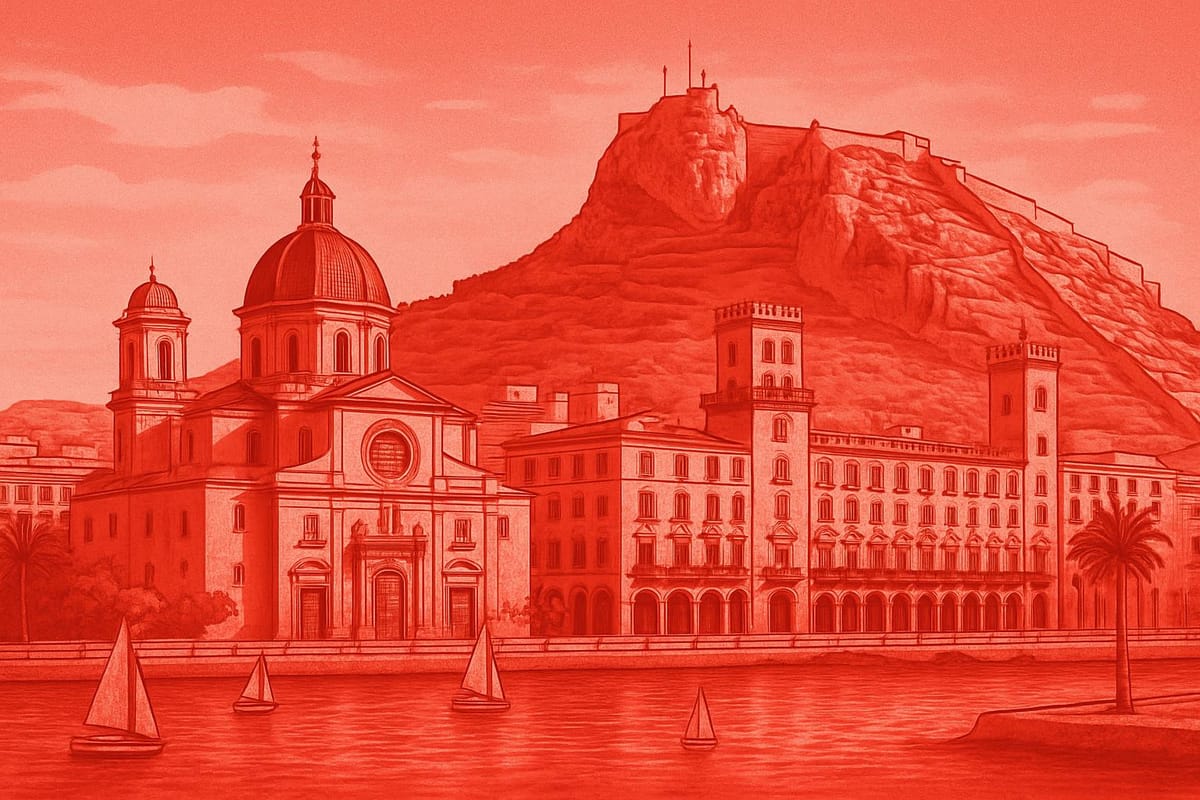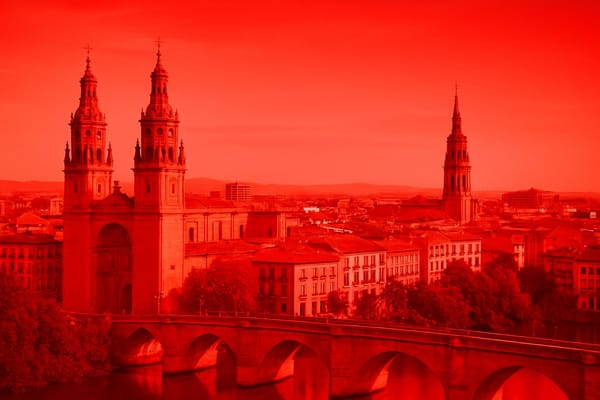Alicante
Golden beaches, clifftop castle, lively marina, tapas & buzzing nightlife by the Mediterranean

Important things to know about Alicante
Alicante, Spain is a dynamic coastal city on the Costa Blanca that blends a relaxed Mediterranean pace with modern urban amenities, where residents and visitors alike appreciate the warm Mediterranean climate, crisp sea breezes and abundant sunshine that shape daily life and outdoor culture; the city’s character is defined by its multicultural population, bilingual streets where Spanish and Valencian mix, a lively gastronomic scene centered on fresh seafood and rice dishes as well as tapas culture, and a year-round calendar of local events that reflect strong regional traditions and community ties. As an economic and educational hub in the region, Alicante hosts a diverse mix of sectors from services and commerce to technology and maritime logistics, supported by good infrastructure including an international airport, rail connections and a functional harbor that facilitate trade and mobility; the presence of higher education institutions and research centers contributes to a youthful, innovative atmosphere while local markets, shops and culinary workshops sustain small businesses and artisanal crafts. Urban neighborhoods offer a blend of historic residential quarters and contemporary developments, with public services, healthcare and green spaces aimed at improving the quality of life for inhabitants; housing options range from traditional apartments to modern complexes, attracting both families and professionals. Alicante’s everyday rhythm is shaped by café culture, market mornings, and evening socializing, making it a city where tradition and modernity intersect, the economy and cultural vitality reinforce one another, and the overall lifestyle appeals to those seeking a sunny, sociable and well-connected Mediterranean urban experience.
Sightseeing hot-spots in Alicante
Alicante, on the sun-drenched shores of the Costa Blanca in Spain, offers a compact mix of history, beach life and vibrant urban culture that makes it perfect for sightseeing. Dominating the skyline is the Castillo de Santa Bárbara, an imposing medieval fortress perched above the city with panoramic views over the port and Mediterranean - a must-see for any visitor who wants a sense of Alicante’s past and spectacular photo opportunities. Strolling down from the castle leads naturally to the palm-lined Explanada de España, the wavy-tiled promenade that defines Alicante’s seaside charm and is ideal for people-watching, street music and leisurely cafés.
The heart of Alicante’s cultural scene is its Old Town and the colorful Barrio de Santa Cruz, where narrow, flower-strewn streets reveal quaint houses, tapas bars and historic churches such as the Alicante Cathedral. Museum-lovers will appreciate the MARQ Archaeological Museum and the MACA (Museo de Arte Contemporáneo de Alicante), both of which showcase the region’s heritage and modern creativity. For beachside relaxation, Postiguet Beach sits within easy walking distance of the center, while the lively marina offers boat trips, seafood restaurants and fresh local flavors - perfect for sampling traditional paella and Alicante’s maritime gastronomy.
Beyond the city, Alicante’s sightseeing highlights extend to nearby escapes like the protected waters around Tabarca Island, ideal for snorkeling and day trips, and scenic drives along the Costa Blanca coastline. Whether you’re planning a weekend break or a longer stay, the combination of historic sites, museums, beaches and culinary delights makes Alicante sightseeing a rewarding and accessible experience for travelers who want the best of Spain in one Mediterranean town.
Hotels to enjoy in Alicante
Exploring hotels in Alicante reveals a variety of options that suit every traveler, from those seeking luxury hotels on the Costa Blanca to budget-conscious visitors hunting for value near the city center. Many Alicante hotels boast sea views of El Postiguet Beach and easy access to the promenade of the Explanada de España, while others put you within walking distance of the historic Santa Bárbara Castle and the bustling marina. Whether you prioritize a beachfront location for sunrise walks, a spa hotel for restorative treatments, or a boutique hotel with local design and intimate service, Alicante’s accommodation scene blends Mediterranean charm with modern comforts. Frequent mentions of free Wi‑Fi, on-site restaurants serving Valencian dishes, and rooftop pools speak directly to what travelers search for when comparing Costa Blanca hotels and planning trips around seasonal festivals or family vacations.
Choosing the right Alicante hotel also means considering practical factors like proximity to Alicante Airport, public transport links, and parking for day trips along the coast. Family-friendly properties often offer kids’ programs and connecting rooms, while business travelers can find conference facilities and convenient access to the financial district. For those drawn to gastronomy, boutique options in the old town place you near tapas bars and markets, while upscale resorts provide concierge services for yacht charters and golf reservations. With keywords such as hotels in Alicante, beachfront, luxury, budget, and family-friendly trending in travel searches, the city remains a compelling choice for sun-seekers and culture lovers alike, promising memorable stays framed by Mediterranean light and lively local character.
Restaurants to try in Alicante
Alicante is a coastal city where the restaurants of Alicante celebrate fresh seafood, sun-ripened produce and the timeless flavors of Mediterranean cooking. Strolling from the Port of Alicante toward the Old Town, you'll find everything from lively tapas bars serving bite-sized classics to elegant dining rooms offering contemporary takes on traditional paella and rice dishes. The culinary scene blends rustic family recipes with modern techniques, so diners can enjoy authentic Alicante cuisine-think grilled fish, seasonal vegetables, and rice cooked with saffron and local stock-alongside inventive plates from chef-driven kitchens. Many restaurants pride themselves on sourcing from nearby markets and the sea, delivering a sense of place in every dish while accommodating varied budgets and tastes.
For travelers searching for the best restaurants in Alicante, neighborhoods like El Barrio and the marina area are hotspots where atmosphere and gastronomy meet. Long lunch services and late-night dinners reflect Spanish dining rhythms, and wine lists tend to emphasize regional bottles that complement seafood and rice-based specialties. Whether you favor casual beachside bites near Postiguet Beach or refined tasting menus in quieter streets, Alicante’s hospitality ensures a memorable meal. Exploring small taverns and modern eateries reveals a vibrant dining ecosystem where traditional flavors, local ingredients and contemporary presentations create a rewarding experience for food lovers and SEO-savvy searches alike.
Best shopping stops in Alicante
Alicante is a vibrant destination for shopping in Alicante, where winding streets and sunlit promenades blend traditional markets with chic boutiques. Stroll along Avenida Maisonnave for flagship stores and international brands, then wander toward the Explanada de España and the marina for artisanal stalls and seaside charm. The heart of local commerce is the Mercado Central, a bustling market where fresh produce, seafood and regional delicacies sit alongside vendors selling handicrafts and ceramics. In the historic quarter, independent shops offer unique fashion, leather goods and jewellery, while galleries and concept stores showcase contemporary Spanish designers - perfect for finding one-of-a-kind souvenirs that capture the spirit of Alicante Spain.
For a more comprehensive shopping experience, head to major shopping centres like El Corte Inglés and Centro Comercial Plaza Mar 2, which combine department-store convenience with international dining and entertainment. Weekend markets and seasonal fairs spotlight local wines, olive oils, espadrilles and traditional pottery, making them essential stops for foodies and collectors. Practical information like extended evening hours in summer, duty-free options for visitors and weekly market days helps travelers plan their trips, while expert service at boutique shops ensures personalized purchases. Whether you seek luxury labels, bargain outlets or authentic regional finds, the shopping highlights of Alicante deliver a memorable blend of tradition and modern retail therapy.
Nightlife highlights in Alicante
Alicante nightlife comes alive as the sun sets over the Mediterranean, with narrow streets in El Barrio filling with the scent of tapas and the chatter of locals and travelers. The city’s compact center means you can hop from classic wine bars to modern cocktail lounges in minutes, sampling artisanal cocktails and regional wines while enjoying small plates of seafood, jamón, and manchego. For a memorable evening, climb toward Santa Bárbara Castle to watch the city lights shimmer against the sea, then descend to the marina where seaside terraces and stylish bars offer a chill atmosphere and panoramic views. Whether you prefer traditional bodegas or contemporary mixology, Alicante nightlife delivers a mix of authentic Spanish charm and cosmopolitan flair that keeps visitors coming back.
When the night deepens, Alicante’s club scene and beach clubs on the Costa Blanca pick up the pace with DJs, live bands, and themed parties that attract both locals and tourists looking for late-night entertainment. Live music venues present flamenco, jazz, and indie acts, while larger venues host electronic and pop nights, ensuring the city’s after-dark options suit every taste. Safe, walkable neighborhoods make bar-hopping easy, and seasonal festivals and summer events amplify the energy, making Alicante nightlife an essential part of any visit to this vibrant Mediterranean destination.
Getting around in Alicante
Alicante offers convenient and well-connected transport options for travelers: Alicante–Elche Miguel Hernández Airport (ALC), one of Spain’s busiest regional airports, handles a large number of international flights, low-cost carriers and seasonal charters, while the city's rail network centered on Alicante train station (Alicante-Terminal) provides reliable domestic and regional connections; passengers arriving at the airport can reach the city by frequent buses, trams, taxis and private transfers, and those looking to continue by rail will find Renfe services linking Alicante to major destinations such as Madrid, Valencia and Barcelona as well as the local Cercanías commuter lines that serve the metropolitan area, making it easy to plan itineraries that combine air and rail travel; recent investments and timetable improvements have strengthened train connections and airport links, so whether you need quick access from Alicante airport to city center, onward high-speed and intercity options, or comfortable local journeys, the transport infrastructure in Alicante is modern, tourist-friendly and geared toward efficient transfers and good regional coverage.
Culture must-see's in Alicante
Alicante, a vibrant city on the Costa Blanca, offers a rich cultural tapestry where history and modern life meet. Dominating the skyline, the Castillo de Santa Bárbara rewards visitors with panoramic views and insights into centuries of local history, while the winding streets of the Old Town and the colorful Barrio de Santa Cruz reveal charming plazas, baroque façades, and artisan shops. Museums play a central role in the culture of Alicante: the archaeological MARQ opens windows into prehistoric and Roman eras, and the contemporary MACA showcases 20th-century masters alongside cutting-edge exhibitions. Strolling along the Explanada de España or the lively port, you encounter street performers, open-air markets, and a calendar of events that underlines Alicante’s reputation for accessible, dynamic cultural life. The blend of Roman ruins, medieval architecture, and modern galleries makes Alicante, Spain, an enticing destination for travelers seeking both education and inspiration.
Beyond monuments and museums, the cultural scene in Alicante throbs with festivals, gastronomy, and creative expression. The world-famous Hogueras de San Juan transforms the city each June into a blaze of bonfires, parades, and satirical art, while smaller music, film and theatre festivals bring an international audience year-round. Alicante’s gastronomy-from seaside seafood and tapas to local wines-fuels a thriving culinary culture linked to traditions and innovation alike. Local theaters, dance companies, and contemporary art spaces collaborate with universities and cultural centers to offer workshops, residencies and performances that reflect both Valencian traditions and global trends. Whether you’re exploring history at MARQ, admiring modern works at MACA, savoring paella by the marina, or joining a festival in the streets, the culture of Alicante, Spain, invites immersive discovery and lasting memories.
History of Alicante
The history of Alicante, Spain traces a long arc from prehistoric settlements through classical antiquity to a bustling modern Mediterranean city. Archaeological evidence shows human presence in the area for millennia, with the ancient Iberian settlement of Lucentum later flourishing under Phoenician and Greek influence before becoming an important Roman outpost. As a coastal harbor on the Mediterranean, Alicante developed as a hub of trade and cultural exchange, its strategic location attracting merchants, sailors and soldiers. Remnants of Roman walls, mosaics and urban layouts testify to a city integrated into the Roman economy and administrative network. After the fall of Rome, the region experienced waves of migration and transformation, with Visigothic presence giving way to centuries of Muslim rule that reshaped agriculture, architecture and irrigation, leaving enduring marks on the landscape and vocabulary of the province.
The medieval and modern chapters of Alicante’s story emphasize resilience, contestation and renewal as the city became part of the Kingdom of Valencia after the Reconquista and later adapted to shifting political and economic tides. The imposing Castillo de Santa Bárbara, perched above the city, symbolizes the layered past from medieval fortifications to Napoleonic-era struggles. During the 18th and 19th centuries Alicante expanded its port and industries, integrating into broader maritime networks and experiencing demographic growth that set the stage for 20th-century urbanization. In recent decades tourism, services and cultural promotion have revitalized Alicante’s economy; festivals like Hogueras de San Juan, museums, and restored historic quarters attract international visitors while local initiatives balance heritage conservation with modern development. Today, Alicante stands as a city where archaeological sites, medieval streets and contemporary boulevards coexist, offering a living narrative that continues to evolve and draw interest from historians, travelers and residents alike.



